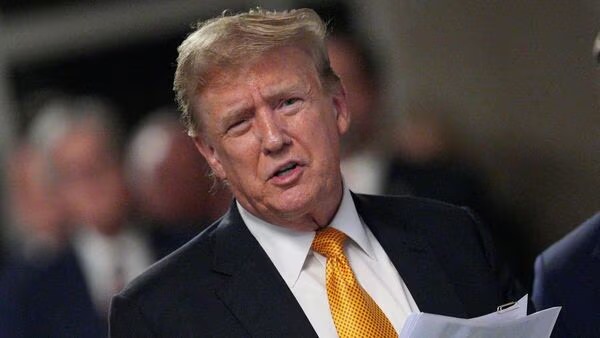Trump Becomes First Major Party Candidate to Accept Crypto Donations

QUICK TAKE
- Donald Trump’s presidential campaign starts accepting crypto donations, including Bitcoin and Ether.
- This follows Trump’s declaration of support for crypto at a Mar-a-Lago event.
- The campaign aims to build a “crypto army” in response to anti-crypto sentiment from figures like Senator Elizabeth Warren.
- Trump’s move contrasts with the Biden administration’s anti-crypto stance.
- The growing importance of crypto in politics may be influencing Democratic strategies.
In a groundbreaking move, Donald J. Trump’s presidential campaign announced on Tuesday that it is now accepting cryptocurrency donations. This initiative makes Trump the first major party candidate to embrace digital currencies like Bitcoin and Ether, fulfilling a promise he made earlier this month. The decision signifies a strategic shift in the 2024 U.S. presidential election, highlighting the increasing political relevance of cryptocurrency.
Trump, who is widely expected to be the Republican nominee, first signaled his support for crypto at a lavish gala held at his Mar-a-Lago estate. During this event, he declared his commitment to becoming the “crypto candidate,” a stance that resonated well with many in the crypto community. This announcement has now materialized into a concrete campaign strategy, with the campaign officially accepting donations in various cryptocurrencies.
The campaign’s statement emphasized its intention to build a “crypto army” to counteract the “anti-crypto army” led by Massachusetts Senator Elizabeth Warren. Warren has been a vocal critic of cryptocurrencies, advocating for stricter regulations and highlighting the potential risks associated with digital assets. In contrast, Trump’s campaign seeks to mobilize crypto enthusiasts and position itself as a defender of digital currency innovation.
Although Trump has yet to detail specific policies regarding cryptocurrency, his favorable stance has garnered support from the crypto community. This is in stark contrast to the current administration under President Joe Biden, which has taken a more adversarial approach to the crypto industry. The Biden administration has implemented various regulatory measures aimed at curbing what it perceives as the excesses and risks associated with cryptocurrencies.
The entry of crypto into mainstream political discourse represents a significant shift. It indicates that cryptocurrencies are becoming an important issue in American politics, influencing the strategies of both major parties. This shift was evident when House Democratic leadership recently decided not to push its members against an upcoming bill on crypto policy, signaling a potential reevaluation of their stance in light of changing public and political sentiments.
Trump’s embrace of crypto donations is not merely a campaign gimmick; it reflects a broader trend of increasing acceptance and integration of digital currencies into the financial and political systems. By accepting crypto donations, Trump’s campaign is tapping into a growing base of crypto supporters who value the decentralized and innovative nature of digital currencies.
This move also sets a precedent for future political campaigns. As the 2024 election approaches, other candidates might feel compelled to adopt similar positions on cryptocurrency to attract tech-savvy voters and investors. The political landscape is rapidly evolving, and the incorporation of crypto into campaign strategies is likely to become more common.
In conclusion, Donald Trump’s acceptance of cryptocurrency donations marks a significant milestone in the intersection of politics and digital finance. By positioning himself as a pro-crypto candidate, Trump is capitalizing on a growing movement and setting the stage for cryptocurrencies to become a central issue in the upcoming election. As the campaign progresses, it will be interesting to see how this stance influences voter sentiment and how other candidates respond to the rising prominence of digital currencies in the political arena.



